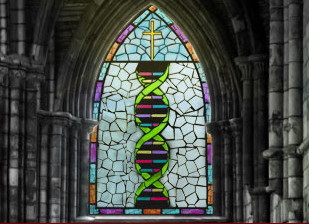
Samford University’s Center for Science and Religion is seeking new support as it concludes a multi-year, grant-funded program of guest speakers, pastor workshops and collaboration with other Samford programs and local churches.
Since its founding in 2009, the center has become an important promoter of science and religion discussion, education and research on campus, producing a number of papers and books, securing grants and developing a unique academic program. Much of that work has been supported by 2014 grants of $200,000 from the John Templeton Foundation and an additional gift of $81,620 secured with assistance from the Issachar Fund.
The grants helped the center present 10 guest lecturers, pastor workshops and an international Transhumanism conference and book, each designed to create a welcoming and supportive space for participants to explore pressing issues at the intersection of science and faith, including transhumanism, genomics, mind-brain issues and artificial intelligence. “I want people to feel like they can talk about these things without feeling like somebody is hammering them,” said Samford math and computer science professor Steve Donaldson, a Senior Fellow and Program Director for the center.
Josh Reeves, Assistant Professor of Science and Religion, has served as the center’s grant administrator and director of its New Directions in Science and Religion project. Although he is the primary administrative figure in the center, funds for his position ran out this summer with the conclusion of the 2014 grants. A new grant from the Templeton World Charity Foundation, approved by the foundation’s trustees in June, will allow Reeves to remain at Samford for two more years.
As part of the new grant Reeves will continue to teach and work on a new book about Christian skepticism of science. In the absence of a permanent source of funds, he will also participate in the time-intensive work of exploring, securing, and administering new grants to continue the center’s work
Although Reeves and Donaldson hope such grants will continue, their long-term goal is for the center to have institutional funding sufficient to insulate it from the boom-and-bust cycle of grants and changes in faculty and staff.
“We desperately need an endowed fund to support ongoing work,” Donaldson said. Toward that end, the ForeverSamford campaign includes a $6M Center for Science and Religion goal to support research, student scholarships, educational programs and an endowed chair. The chair is the largest part of that goal, and plays a key role in the success of the other work. “Until we get that, this center is still a labor of love,” Donaldson said.
In the short term, the center will focus on recruiting more students for Samford’s Science and Religion academic major and minor, and continue to engage young people through more guest speakers and church partnerships like its ongoing Science and Theology for Emerging Adults Ministries (STEAM) Project with Dawson Memorial Baptist Church in Homewood, Alabama.
“We’re helping young Christians think about these issues in responsible ways,” Reeves said.
With the foundation of knowledge in science and religion Samford provides, these new generations of believers will understand that they don’t have to choose between the two.
Those interested in facilitating discussion groups with the Center for Science and Religion or in helping in another way can contact Rhonda White at rwhite7@samford.edu or 205-726-4371.
